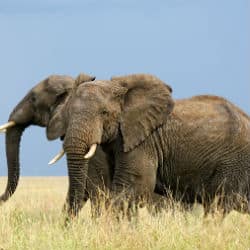Wild Elephants Only Get A Couple Of Hours Of Sleep A Night

According to the results of a new study wild African elephants sleep the least amount of time of any mammal. Scientists looked at two Botswanan elephants to elicit more information about the pachyderm’s natural sleep patterns. In captivity, elephants sleep between four to six hours a day, however in the wild, elephants sleep for only a couple of hours and mainly during the night. The elephants that were studied were both matriarchs of their herds and sometimes stayed awake for days at a time.
Travel large distances
During the time spent awake, they tended to travel huge distances. The researchers speculated that this was perhaps to escape lions or poachers. The elephants entered into rapid eye movement (REM or dream sleep) every three or four days, when they slept lying down rather than on their feet. Professor Paul Manger, author of the study says elephant sleep is unique because they are shortest sleeping mammal and there appears to be a relationship with their large body size.
“It seems like elephants only dream every three to four days. Given the well-known memory of the elephant this calls into question theories associating REM sleep with memory consolidation.” Dr Manger said.
Lots of studies done of elephants in captivity
There have been numerous studies undertaken of elephants living in captivity. In order to accumulate more information about the sleeping habits of wild elephants, professor Manger and his team fitted a device under the skin of the animal’s trunk. The device essentially recorded when the elephants were sleeping based on whether their trunks stayed still for five minutes or longer. Gyroscopes were also fitted to the two elephants to determine their sleeping position. The elephants were then tracked for five weeks and this gave the researches new insights into their natural sleep patterns.
“We had the idea that elephants should be the shortest sleeping mammal because they’re the largest. Why this occurs, we’re not really sure. Sleep is one of those really unusual mysteries of biology, that along with eating and reproduction, it’s one of the biological imperatives. We must sleep to survive.” Professor Manger said.
Dreaming sleep
In nature, the rule is that smaller bodied animals generally sleep for longer than larger one. One example of this is the sloth which sleeps for 14 hours a day whilst humans sleep for about 8 hours. How elephants are able to survive on such a low amount of sleep remains a mystery. The researchers intend to conduct further studies including on males and they wish to learn more about REM sleep in elephants. It is believed that REM sleep is critical in the formation of memories. It is a type of sleep that is ubiquitous across the animal kingdom, including in mammals, birds and even reptiles. Most mammals enter into REM sleep on a daily basis.



